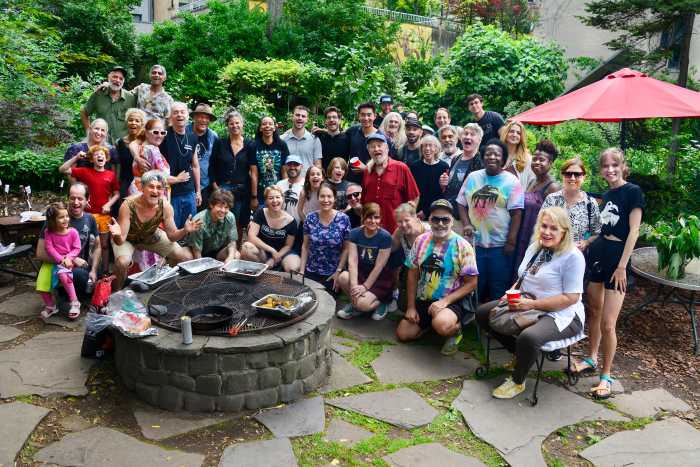By Casey Samulski
When Angel Seda asked the room, mostly young students, to stand up if they knew someone who had experienced violence, nearly the whole place was on its feet. Most were still out of their seats when he asked if it was a young person.
It’s a startling illustration of what Lower East Side teenagers confront in growing up and going to school — and a compelling reason for why students themselves can be part of the solution of standing up against gang violence, domestic abuse and crime.
It’s this last idea — of students being the difference in ending the cycle of violence — that was a recurring theme at the Power of Peace, or POP, conference on Monday in the Council Chambers at City Hall. The effort was a partnership between City Councilmember Rosie Mendez and the Lower Eastside Girls Club. All of the panel speakers stated time and again that youth are, and must be, part of the answer.
The POP Coalition was formed in the spring after the murder of a young neighborhood resident, Tina Negron, by her boyfriend in the Avenue A Key Food supermarket. POP’s stated goal is to address violence at all levels of the community. Looking at issues of police brutality, gang violence and bullying, all the way up to global militarism and prison policy, POP is designed to build dialogue between students, community organizers and the city.
Violence in areas like the Lower East Side is what Lyn Pentecost, executive director of the Girls Club, called “an inside-and-outside problem,” in which youth are both perpetrators and victims. And as one of the panel members, Actress Tina Huang, who grew up in Chinatown, explained, students making their voices heard is crucial to the process because “no one can tell your story.”
It seemed everyone, panel included, had a story to tell.
Starting things off, Mendez, spoke of the murder of her former Democratic district co-leader, Armando Perez, brutally beaten to death nine years ago outside his own home, and the trials caused by a mishandled investigation.
Actress Rosario Dawson next recounted her own tumultuous childhood, growing up squatting in an abandoned East Village building with two young activist parents who “built our home around us.” She described a hard home life coupled with a strong sense of responsibility toward others in her community, her own mother often the one to intervene in street confrontations between rival gangs.
Ben Valentin, a poet, social worker and activist, asked for a moment of silence for the Hudson family, following the just-confirmed death of 7-year-old Julian Hudson, nephew of Oscar-winning actress Jennifer Hudson. It was a shocking reminder of the pandemic of violence in our society, and he told students that “even today” there are new victims.
Valentin is the brother of Tina Negron, whose murder inspired the formation of the new peace group. The story of his sister and the issues he’s faced, dealing with the poor and addicted, affirmed to the students that it was coalitions like POP and individuals like them that are so desperately needed to stop the violence.
The next speaker, Baty Landis, organizer of Silence Is Violence, told of the New Orleans murders of friends Dinerral Shavers and Helen Hill. Landis recalled the shock at hearing “young black man killed” on the news, a phrase she had once “heard so many times and never felt anything,” only to find out that it was her friend Shavers. After she and her neighbors organized a 5,000-strong march to the steps of City Hall, Baty realized, “We had to continue.”
The panel’s last speaker, Reverend Osagyefo Uhuru Sekou of Middle Collegiate Church, delivered one of the most compelling addresses to the students. Sekou told of how he was the only of his three brothers to graduate high school and the only one not behind bars. He spoke of his alcoholic mother and a difficult upbringing.
“Life has dealt some of you a bad hand,” Sekou said, “but I need you to play the hand.”
Sekou spoke of the generations of immigrants that had come before them, immigrants with dreams of a better life but not always the means to get them, “building your communities from the ground up.” People who would never have access to City Hall, to come and have these issues addressed with officials like Councilmember Mendez present. That, he said, is why it was so important students stay involved. Speaking of the future generations of East Villagers and Lower East Siders, he said, “There are others depending on you.”





































